Balancing Career and Family: Impact on Human Resource Management in Tesco Plc
VerifiedAdded on 2023/06/10
|12
|3253
|387
AI Summary
This study discusses the challenges of human resource management in Tesco Plc due to the balance between career and family. It highlights the impact of this balance on the HR department and provides recommendations for addressing issues faced by employees. The study also discusses the barr...
Read More
Contribute Materials
Your contribution can guide someone’s learning journey. Share your
documents today.
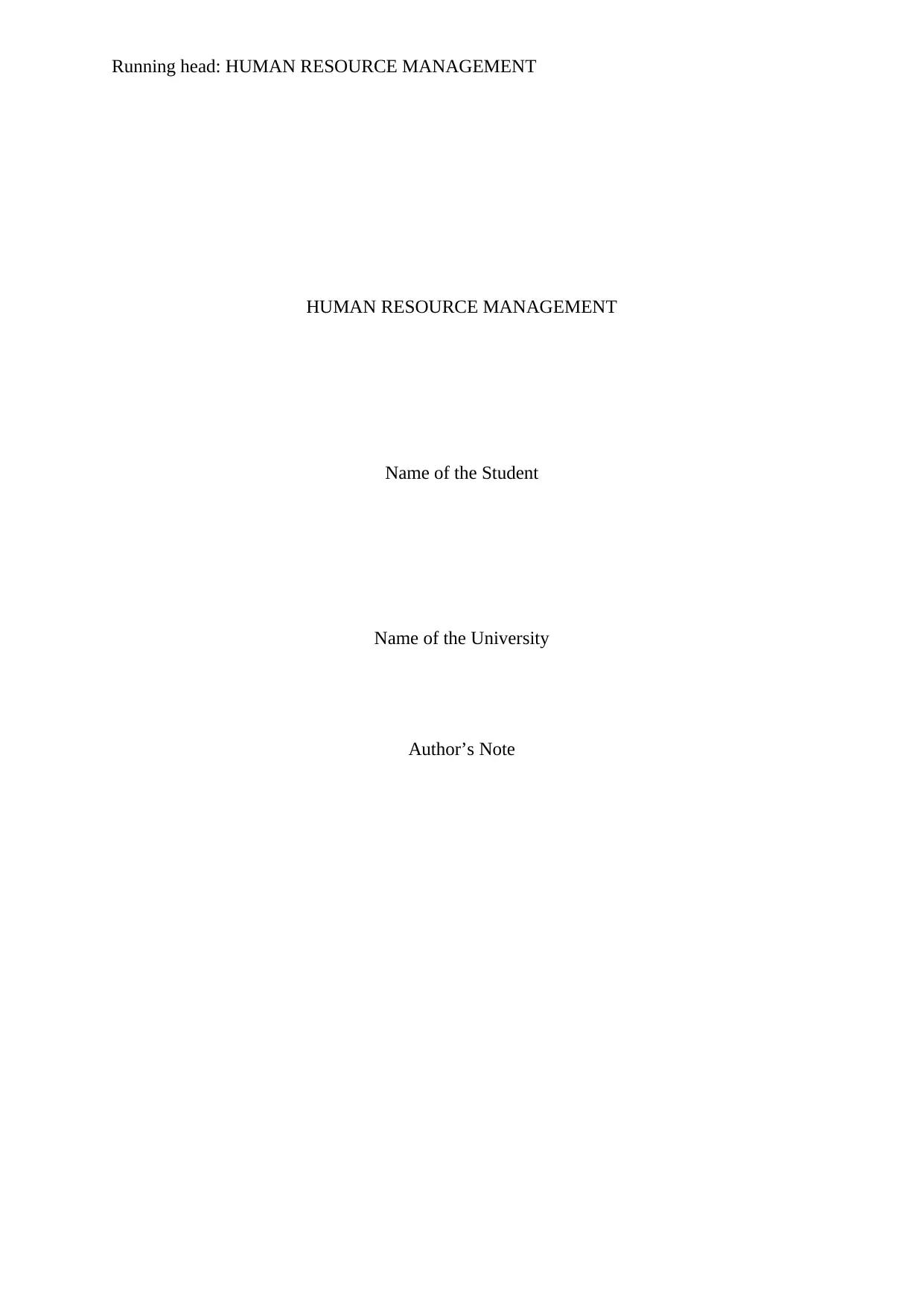
Running head: HUMAN RESOURCE MANAGEMENT
HUMAN RESOURCE MANAGEMENT
Name of the Student
Name of the University
Author’s Note
HUMAN RESOURCE MANAGEMENT
Name of the Student
Name of the University
Author’s Note
Secure Best Marks with AI Grader
Need help grading? Try our AI Grader for instant feedback on your assignments.
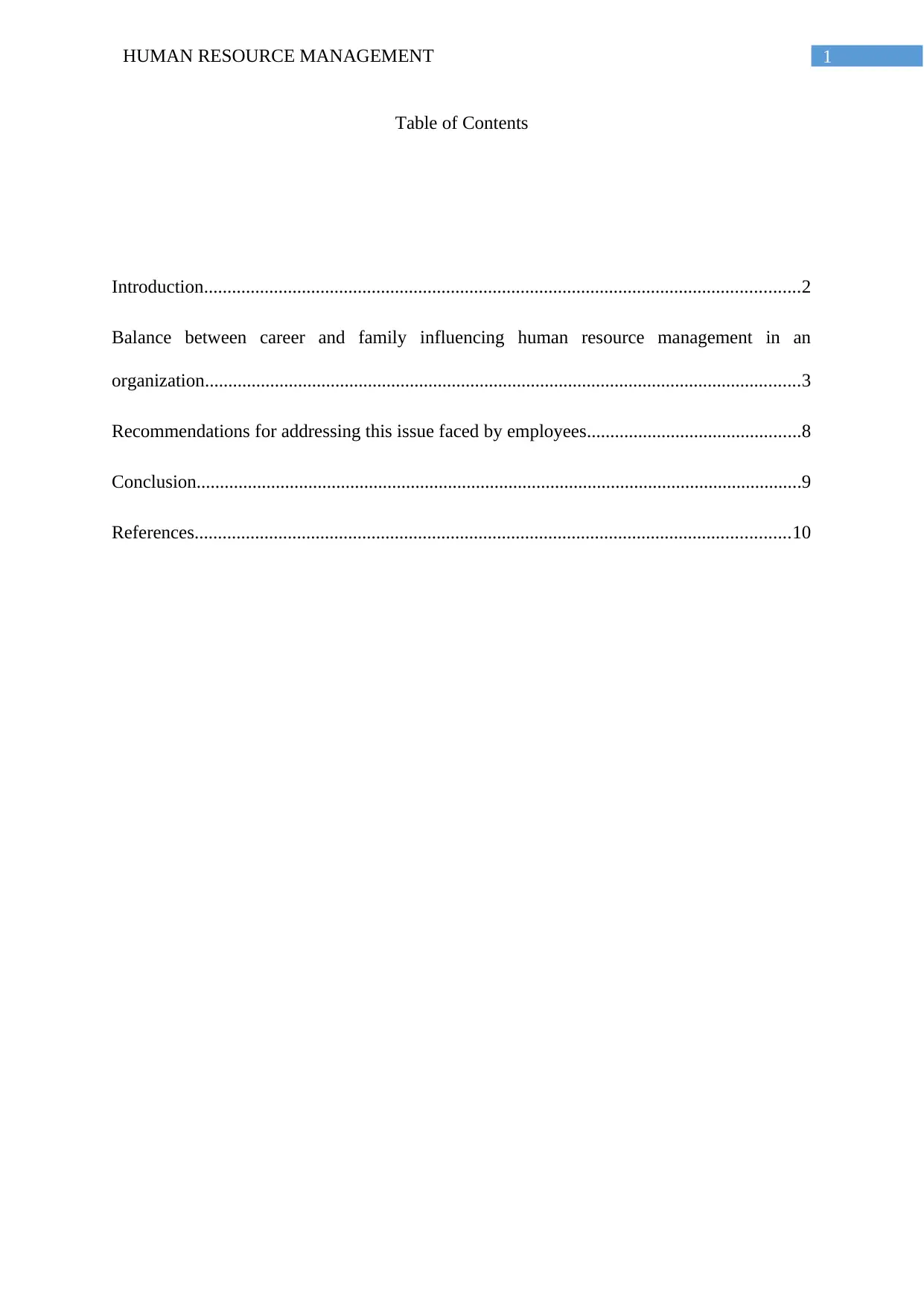
1HUMAN RESOURCE MANAGEMENT
Table of Contents
Introduction................................................................................................................................2
Balance between career and family influencing human resource management in an
organization................................................................................................................................3
Recommendations for addressing this issue faced by employees..............................................8
Conclusion..................................................................................................................................9
References................................................................................................................................10
Table of Contents
Introduction................................................................................................................................2
Balance between career and family influencing human resource management in an
organization................................................................................................................................3
Recommendations for addressing this issue faced by employees..............................................8
Conclusion..................................................................................................................................9
References................................................................................................................................10
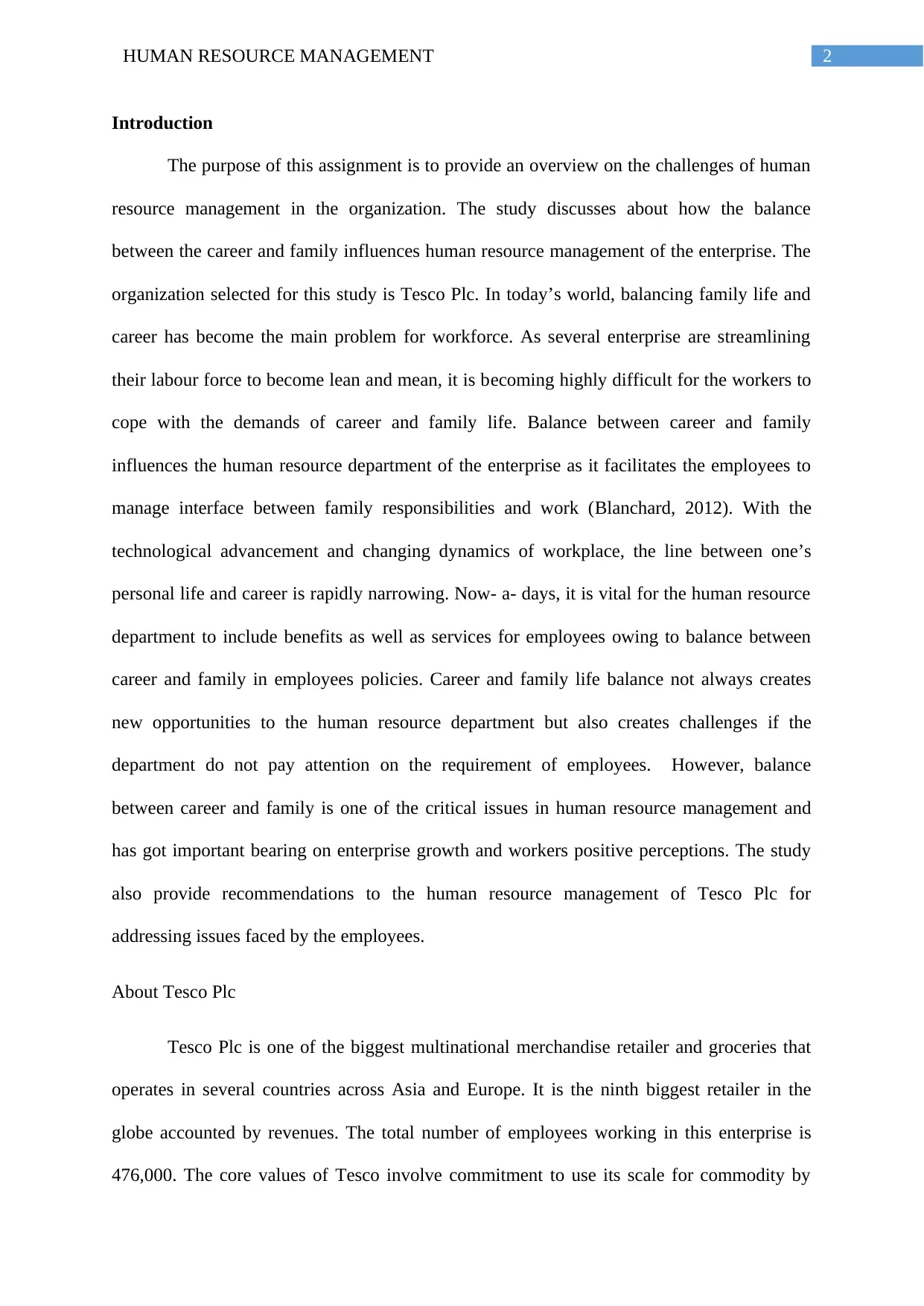
2HUMAN RESOURCE MANAGEMENT
Introduction
The purpose of this assignment is to provide an overview on the challenges of human
resource management in the organization. The study discusses about how the balance
between the career and family influences human resource management of the enterprise. The
organization selected for this study is Tesco Plc. In today’s world, balancing family life and
career has become the main problem for workforce. As several enterprise are streamlining
their labour force to become lean and mean, it is becoming highly difficult for the workers to
cope with the demands of career and family life. Balance between career and family
influences the human resource department of the enterprise as it facilitates the employees to
manage interface between family responsibilities and work (Blanchard, 2012). With the
technological advancement and changing dynamics of workplace, the line between one’s
personal life and career is rapidly narrowing. Now- a- days, it is vital for the human resource
department to include benefits as well as services for employees owing to balance between
career and family in employees policies. Career and family life balance not always creates
new opportunities to the human resource department but also creates challenges if the
department do not pay attention on the requirement of employees. However, balance
between career and family is one of the critical issues in human resource management and
has got important bearing on enterprise growth and workers positive perceptions. The study
also provide recommendations to the human resource management of Tesco Plc for
addressing issues faced by the employees.
About Tesco Plc
Tesco Plc is one of the biggest multinational merchandise retailer and groceries that
operates in several countries across Asia and Europe. It is the ninth biggest retailer in the
globe accounted by revenues. The total number of employees working in this enterprise is
476,000. The core values of Tesco involve commitment to use its scale for commodity by
Introduction
The purpose of this assignment is to provide an overview on the challenges of human
resource management in the organization. The study discusses about how the balance
between the career and family influences human resource management of the enterprise. The
organization selected for this study is Tesco Plc. In today’s world, balancing family life and
career has become the main problem for workforce. As several enterprise are streamlining
their labour force to become lean and mean, it is becoming highly difficult for the workers to
cope with the demands of career and family life. Balance between career and family
influences the human resource department of the enterprise as it facilitates the employees to
manage interface between family responsibilities and work (Blanchard, 2012). With the
technological advancement and changing dynamics of workplace, the line between one’s
personal life and career is rapidly narrowing. Now- a- days, it is vital for the human resource
department to include benefits as well as services for employees owing to balance between
career and family in employees policies. Career and family life balance not always creates
new opportunities to the human resource department but also creates challenges if the
department do not pay attention on the requirement of employees. However, balance
between career and family is one of the critical issues in human resource management and
has got important bearing on enterprise growth and workers positive perceptions. The study
also provide recommendations to the human resource management of Tesco Plc for
addressing issues faced by the employees.
About Tesco Plc
Tesco Plc is one of the biggest multinational merchandise retailer and groceries that
operates in several countries across Asia and Europe. It is the ninth biggest retailer in the
globe accounted by revenues. The total number of employees working in this enterprise is
476,000. The core values of Tesco involve commitment to use its scale for commodity by
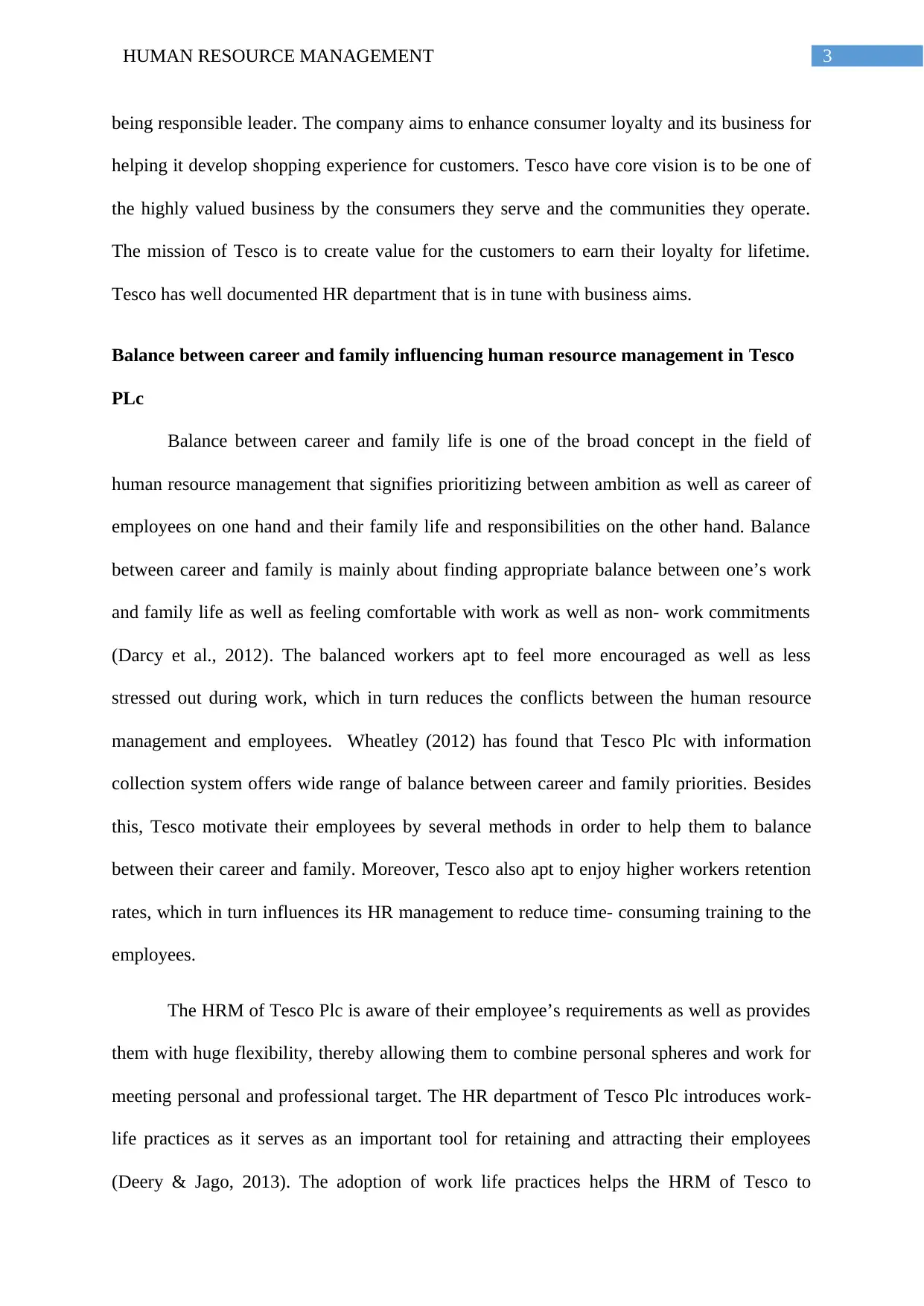
3HUMAN RESOURCE MANAGEMENT
being responsible leader. The company aims to enhance consumer loyalty and its business for
helping it develop shopping experience for customers. Tesco have core vision is to be one of
the highly valued business by the consumers they serve and the communities they operate.
The mission of Tesco is to create value for the customers to earn their loyalty for lifetime.
Tesco has well documented HR department that is in tune with business aims.
Balance between career and family influencing human resource management in Tesco
PLc
Balance between career and family life is one of the broad concept in the field of
human resource management that signifies prioritizing between ambition as well as career of
employees on one hand and their family life and responsibilities on the other hand. Balance
between career and family is mainly about finding appropriate balance between one’s work
and family life as well as feeling comfortable with work as well as non- work commitments
(Darcy et al., 2012). The balanced workers apt to feel more encouraged as well as less
stressed out during work, which in turn reduces the conflicts between the human resource
management and employees. Wheatley (2012) has found that Tesco Plc with information
collection system offers wide range of balance between career and family priorities. Besides
this, Tesco motivate their employees by several methods in order to help them to balance
between their career and family. Moreover, Tesco also apt to enjoy higher workers retention
rates, which in turn influences its HR management to reduce time- consuming training to the
employees.
The HRM of Tesco Plc is aware of their employee’s requirements as well as provides
them with huge flexibility, thereby allowing them to combine personal spheres and work for
meeting personal and professional target. The HR department of Tesco Plc introduces work-
life practices as it serves as an important tool for retaining and attracting their employees
(Deery & Jago, 2013). The adoption of work life practices helps the HRM of Tesco to
being responsible leader. The company aims to enhance consumer loyalty and its business for
helping it develop shopping experience for customers. Tesco have core vision is to be one of
the highly valued business by the consumers they serve and the communities they operate.
The mission of Tesco is to create value for the customers to earn their loyalty for lifetime.
Tesco has well documented HR department that is in tune with business aims.
Balance between career and family influencing human resource management in Tesco
PLc
Balance between career and family life is one of the broad concept in the field of
human resource management that signifies prioritizing between ambition as well as career of
employees on one hand and their family life and responsibilities on the other hand. Balance
between career and family is mainly about finding appropriate balance between one’s work
and family life as well as feeling comfortable with work as well as non- work commitments
(Darcy et al., 2012). The balanced workers apt to feel more encouraged as well as less
stressed out during work, which in turn reduces the conflicts between the human resource
management and employees. Wheatley (2012) has found that Tesco Plc with information
collection system offers wide range of balance between career and family priorities. Besides
this, Tesco motivate their employees by several methods in order to help them to balance
between their career and family. Moreover, Tesco also apt to enjoy higher workers retention
rates, which in turn influences its HR management to reduce time- consuming training to the
employees.
The HRM of Tesco Plc is aware of their employee’s requirements as well as provides
them with huge flexibility, thereby allowing them to combine personal spheres and work for
meeting personal and professional target. The HR department of Tesco Plc introduces work-
life practices as it serves as an important tool for retaining and attracting their employees
(Deery & Jago, 2013). The adoption of work life practices helps the HRM of Tesco to
Secure Best Marks with AI Grader
Need help grading? Try our AI Grader for instant feedback on your assignments.
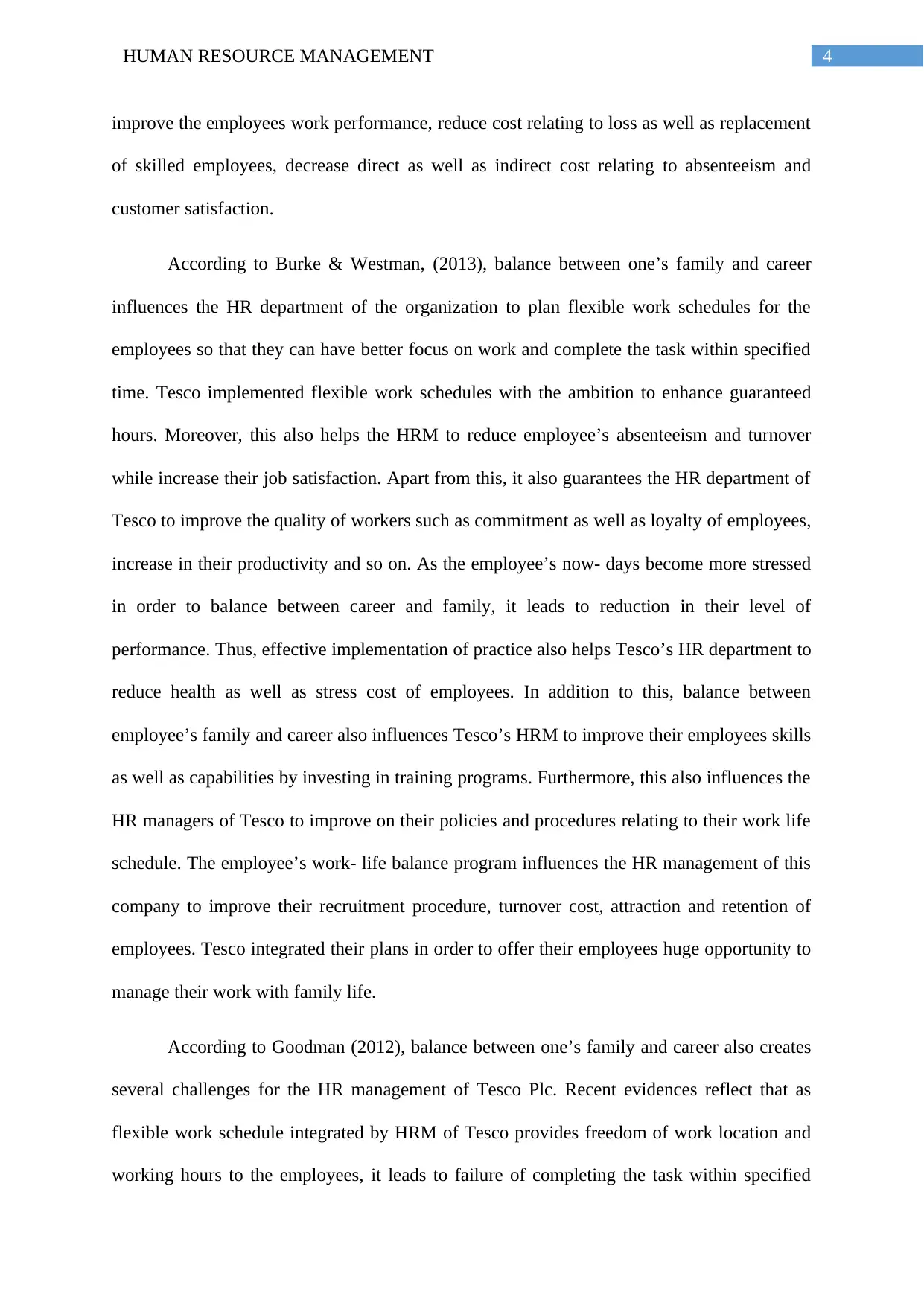
4HUMAN RESOURCE MANAGEMENT
improve the employees work performance, reduce cost relating to loss as well as replacement
of skilled employees, decrease direct as well as indirect cost relating to absenteeism and
customer satisfaction.
According to Burke & Westman, (2013), balance between one’s family and career
influences the HR department of the organization to plan flexible work schedules for the
employees so that they can have better focus on work and complete the task within specified
time. Tesco implemented flexible work schedules with the ambition to enhance guaranteed
hours. Moreover, this also helps the HRM to reduce employee’s absenteeism and turnover
while increase their job satisfaction. Apart from this, it also guarantees the HR department of
Tesco to improve the quality of workers such as commitment as well as loyalty of employees,
increase in their productivity and so on. As the employee’s now- days become more stressed
in order to balance between career and family, it leads to reduction in their level of
performance. Thus, effective implementation of practice also helps Tesco’s HR department to
reduce health as well as stress cost of employees. In addition to this, balance between
employee’s family and career also influences Tesco’s HRM to improve their employees skills
as well as capabilities by investing in training programs. Furthermore, this also influences the
HR managers of Tesco to improve on their policies and procedures relating to their work life
schedule. The employee’s work- life balance program influences the HR management of this
company to improve their recruitment procedure, turnover cost, attraction and retention of
employees. Tesco integrated their plans in order to offer their employees huge opportunity to
manage their work with family life.
According to Goodman (2012), balance between one’s family and career also creates
several challenges for the HR management of Tesco Plc. Recent evidences reflect that as
flexible work schedule integrated by HRM of Tesco provides freedom of work location and
working hours to the employees, it leads to failure of completing the task within specified
improve the employees work performance, reduce cost relating to loss as well as replacement
of skilled employees, decrease direct as well as indirect cost relating to absenteeism and
customer satisfaction.
According to Burke & Westman, (2013), balance between one’s family and career
influences the HR department of the organization to plan flexible work schedules for the
employees so that they can have better focus on work and complete the task within specified
time. Tesco implemented flexible work schedules with the ambition to enhance guaranteed
hours. Moreover, this also helps the HRM to reduce employee’s absenteeism and turnover
while increase their job satisfaction. Apart from this, it also guarantees the HR department of
Tesco to improve the quality of workers such as commitment as well as loyalty of employees,
increase in their productivity and so on. As the employee’s now- days become more stressed
in order to balance between career and family, it leads to reduction in their level of
performance. Thus, effective implementation of practice also helps Tesco’s HR department to
reduce health as well as stress cost of employees. In addition to this, balance between
employee’s family and career also influences Tesco’s HRM to improve their employees skills
as well as capabilities by investing in training programs. Furthermore, this also influences the
HR managers of Tesco to improve on their policies and procedures relating to their work life
schedule. The employee’s work- life balance program influences the HR management of this
company to improve their recruitment procedure, turnover cost, attraction and retention of
employees. Tesco integrated their plans in order to offer their employees huge opportunity to
manage their work with family life.
According to Goodman (2012), balance between one’s family and career also creates
several challenges for the HR management of Tesco Plc. Recent evidences reflect that as
flexible work schedule integrated by HRM of Tesco provides freedom of work location and
working hours to the employees, it leads to failure of completing the task within specified
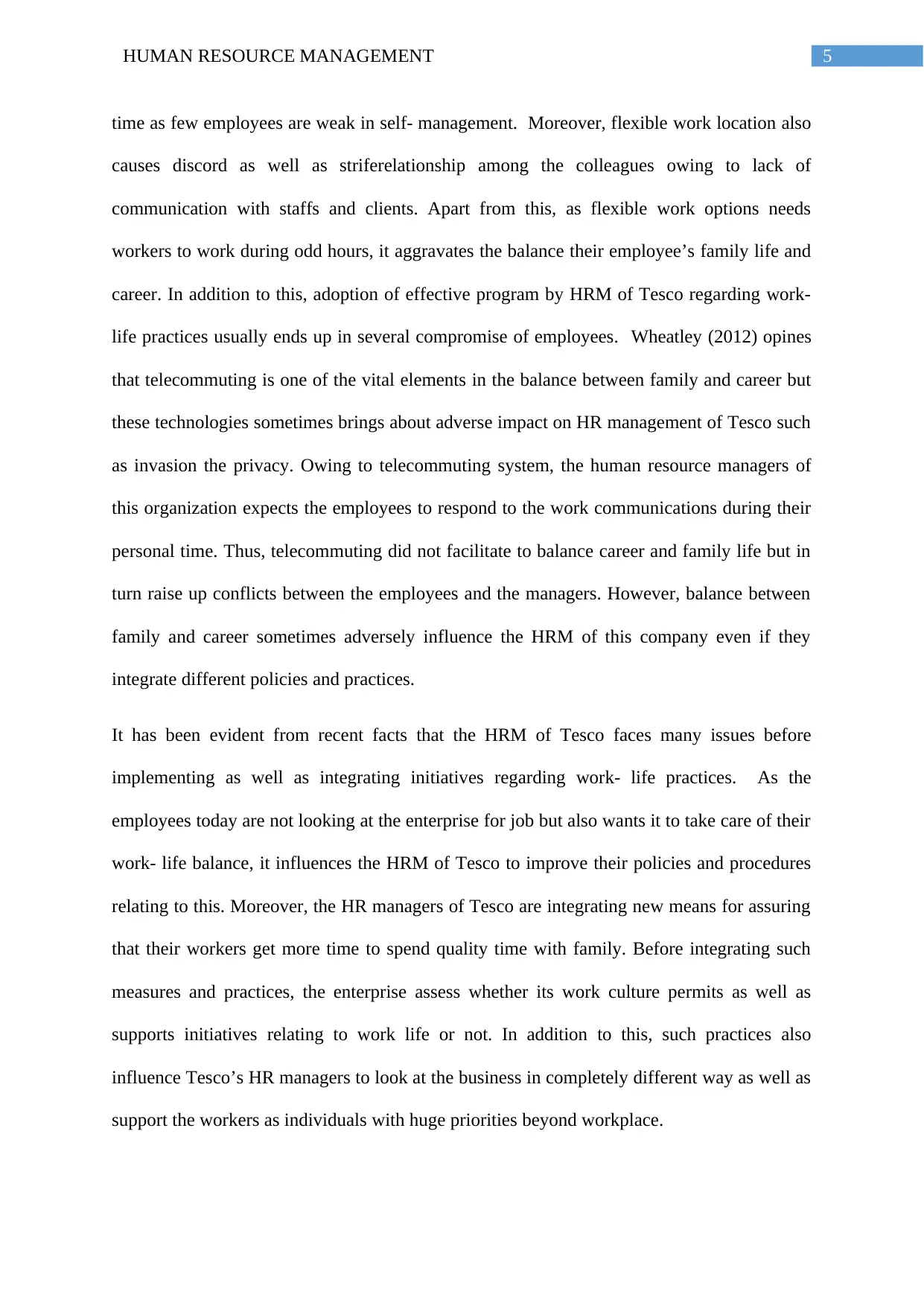
5HUMAN RESOURCE MANAGEMENT
time as few employees are weak in self- management. Moreover, flexible work location also
causes discord as well as striferelationship among the colleagues owing to lack of
communication with staffs and clients. Apart from this, as flexible work options needs
workers to work during odd hours, it aggravates the balance their employee’s family life and
career. In addition to this, adoption of effective program by HRM of Tesco regarding work-
life practices usually ends up in several compromise of employees. Wheatley (2012) opines
that telecommuting is one of the vital elements in the balance between family and career but
these technologies sometimes brings about adverse impact on HR management of Tesco such
as invasion the privacy. Owing to telecommuting system, the human resource managers of
this organization expects the employees to respond to the work communications during their
personal time. Thus, telecommuting did not facilitate to balance career and family life but in
turn raise up conflicts between the employees and the managers. However, balance between
family and career sometimes adversely influence the HRM of this company even if they
integrate different policies and practices.
It has been evident from recent facts that the HRM of Tesco faces many issues before
implementing as well as integrating initiatives regarding work- life practices. As the
employees today are not looking at the enterprise for job but also wants it to take care of their
work- life balance, it influences the HRM of Tesco to improve their policies and procedures
relating to this. Moreover, the HR managers of Tesco are integrating new means for assuring
that their workers get more time to spend quality time with family. Before integrating such
measures and practices, the enterprise assess whether its work culture permits as well as
supports initiatives relating to work life or not. In addition to this, such practices also
influence Tesco’s HR managers to look at the business in completely different way as well as
support the workers as individuals with huge priorities beyond workplace.
time as few employees are weak in self- management. Moreover, flexible work location also
causes discord as well as striferelationship among the colleagues owing to lack of
communication with staffs and clients. Apart from this, as flexible work options needs
workers to work during odd hours, it aggravates the balance their employee’s family life and
career. In addition to this, adoption of effective program by HRM of Tesco regarding work-
life practices usually ends up in several compromise of employees. Wheatley (2012) opines
that telecommuting is one of the vital elements in the balance between family and career but
these technologies sometimes brings about adverse impact on HR management of Tesco such
as invasion the privacy. Owing to telecommuting system, the human resource managers of
this organization expects the employees to respond to the work communications during their
personal time. Thus, telecommuting did not facilitate to balance career and family life but in
turn raise up conflicts between the employees and the managers. However, balance between
family and career sometimes adversely influence the HRM of this company even if they
integrate different policies and practices.
It has been evident from recent facts that the HRM of Tesco faces many issues before
implementing as well as integrating initiatives regarding work- life practices. As the
employees today are not looking at the enterprise for job but also wants it to take care of their
work- life balance, it influences the HRM of Tesco to improve their policies and procedures
relating to this. Moreover, the HR managers of Tesco are integrating new means for assuring
that their workers get more time to spend quality time with family. Before integrating such
measures and practices, the enterprise assess whether its work culture permits as well as
supports initiatives relating to work life or not. In addition to this, such practices also
influence Tesco’s HR managers to look at the business in completely different way as well as
support the workers as individuals with huge priorities beyond workplace.
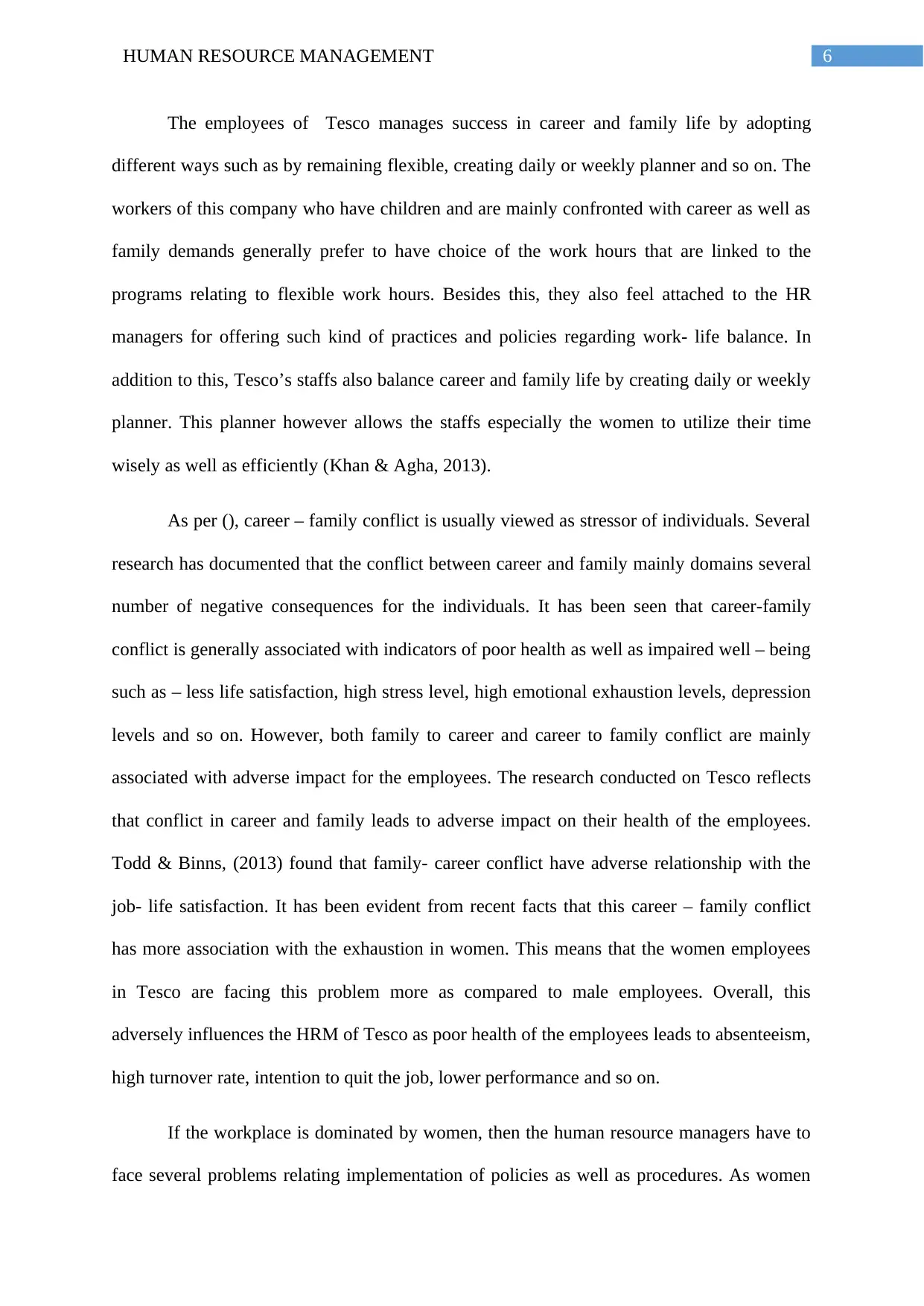
6HUMAN RESOURCE MANAGEMENT
The employees of Tesco manages success in career and family life by adopting
different ways such as by remaining flexible, creating daily or weekly planner and so on. The
workers of this company who have children and are mainly confronted with career as well as
family demands generally prefer to have choice of the work hours that are linked to the
programs relating to flexible work hours. Besides this, they also feel attached to the HR
managers for offering such kind of practices and policies regarding work- life balance. In
addition to this, Tesco’s staffs also balance career and family life by creating daily or weekly
planner. This planner however allows the staffs especially the women to utilize their time
wisely as well as efficiently (Khan & Agha, 2013).
As per (), career – family conflict is usually viewed as stressor of individuals. Several
research has documented that the conflict between career and family mainly domains several
number of negative consequences for the individuals. It has been seen that career-family
conflict is generally associated with indicators of poor health as well as impaired well – being
such as – less life satisfaction, high stress level, high emotional exhaustion levels, depression
levels and so on. However, both family to career and career to family conflict are mainly
associated with adverse impact for the employees. The research conducted on Tesco reflects
that conflict in career and family leads to adverse impact on their health of the employees.
Todd & Binns, (2013) found that family- career conflict have adverse relationship with the
job- life satisfaction. It has been evident from recent facts that this career – family conflict
has more association with the exhaustion in women. This means that the women employees
in Tesco are facing this problem more as compared to male employees. Overall, this
adversely influences the HRM of Tesco as poor health of the employees leads to absenteeism,
high turnover rate, intention to quit the job, lower performance and so on.
If the workplace is dominated by women, then the human resource managers have to
face several problems relating implementation of policies as well as procedures. As women
The employees of Tesco manages success in career and family life by adopting
different ways such as by remaining flexible, creating daily or weekly planner and so on. The
workers of this company who have children and are mainly confronted with career as well as
family demands generally prefer to have choice of the work hours that are linked to the
programs relating to flexible work hours. Besides this, they also feel attached to the HR
managers for offering such kind of practices and policies regarding work- life balance. In
addition to this, Tesco’s staffs also balance career and family life by creating daily or weekly
planner. This planner however allows the staffs especially the women to utilize their time
wisely as well as efficiently (Khan & Agha, 2013).
As per (), career – family conflict is usually viewed as stressor of individuals. Several
research has documented that the conflict between career and family mainly domains several
number of negative consequences for the individuals. It has been seen that career-family
conflict is generally associated with indicators of poor health as well as impaired well – being
such as – less life satisfaction, high stress level, high emotional exhaustion levels, depression
levels and so on. However, both family to career and career to family conflict are mainly
associated with adverse impact for the employees. The research conducted on Tesco reflects
that conflict in career and family leads to adverse impact on their health of the employees.
Todd & Binns, (2013) found that family- career conflict have adverse relationship with the
job- life satisfaction. It has been evident from recent facts that this career – family conflict
has more association with the exhaustion in women. This means that the women employees
in Tesco are facing this problem more as compared to male employees. Overall, this
adversely influences the HRM of Tesco as poor health of the employees leads to absenteeism,
high turnover rate, intention to quit the job, lower performance and so on.
If the workplace is dominated by women, then the human resource managers have to
face several problems relating implementation of policies as well as procedures. As women
Paraphrase This Document
Need a fresh take? Get an instant paraphrase of this document with our AI Paraphraser
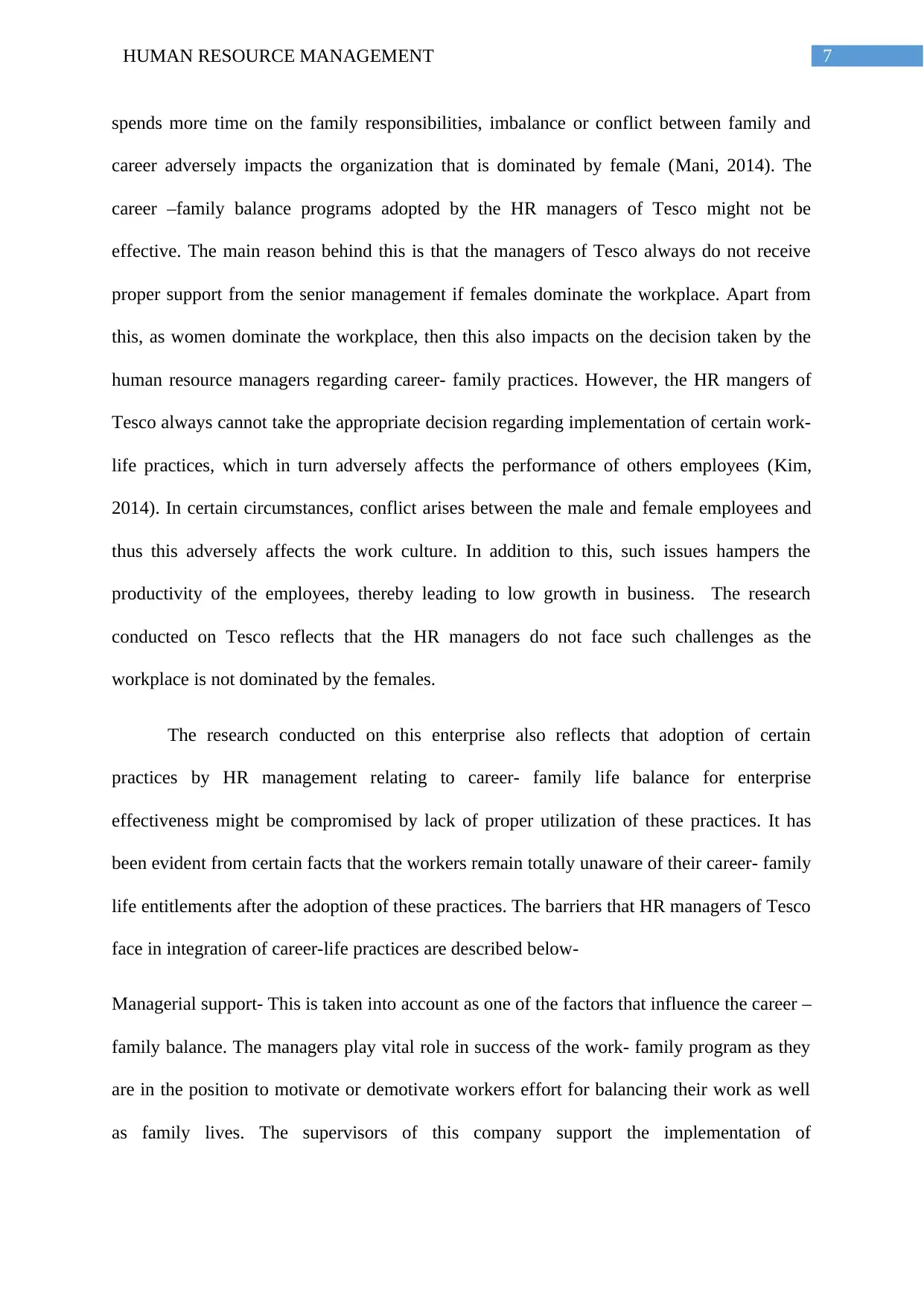
7HUMAN RESOURCE MANAGEMENT
spends more time on the family responsibilities, imbalance or conflict between family and
career adversely impacts the organization that is dominated by female (Mani, 2014). The
career –family balance programs adopted by the HR managers of Tesco might not be
effective. The main reason behind this is that the managers of Tesco always do not receive
proper support from the senior management if females dominate the workplace. Apart from
this, as women dominate the workplace, then this also impacts on the decision taken by the
human resource managers regarding career- family practices. However, the HR mangers of
Tesco always cannot take the appropriate decision regarding implementation of certain work-
life practices, which in turn adversely affects the performance of others employees (Kim,
2014). In certain circumstances, conflict arises between the male and female employees and
thus this adversely affects the work culture. In addition to this, such issues hampers the
productivity of the employees, thereby leading to low growth in business. The research
conducted on Tesco reflects that the HR managers do not face such challenges as the
workplace is not dominated by the females.
The research conducted on this enterprise also reflects that adoption of certain
practices by HR management relating to career- family life balance for enterprise
effectiveness might be compromised by lack of proper utilization of these practices. It has
been evident from certain facts that the workers remain totally unaware of their career- family
life entitlements after the adoption of these practices. The barriers that HR managers of Tesco
face in integration of career-life practices are described below-
Managerial support- This is taken into account as one of the factors that influence the career –
family balance. The managers play vital role in success of the work- family program as they
are in the position to motivate or demotivate workers effort for balancing their work as well
as family lives. The supervisors of this company support the implementation of
spends more time on the family responsibilities, imbalance or conflict between family and
career adversely impacts the organization that is dominated by female (Mani, 2014). The
career –family balance programs adopted by the HR managers of Tesco might not be
effective. The main reason behind this is that the managers of Tesco always do not receive
proper support from the senior management if females dominate the workplace. Apart from
this, as women dominate the workplace, then this also impacts on the decision taken by the
human resource managers regarding career- family practices. However, the HR mangers of
Tesco always cannot take the appropriate decision regarding implementation of certain work-
life practices, which in turn adversely affects the performance of others employees (Kim,
2014). In certain circumstances, conflict arises between the male and female employees and
thus this adversely affects the work culture. In addition to this, such issues hampers the
productivity of the employees, thereby leading to low growth in business. The research
conducted on Tesco reflects that the HR managers do not face such challenges as the
workplace is not dominated by the females.
The research conducted on this enterprise also reflects that adoption of certain
practices by HR management relating to career- family life balance for enterprise
effectiveness might be compromised by lack of proper utilization of these practices. It has
been evident from certain facts that the workers remain totally unaware of their career- family
life entitlements after the adoption of these practices. The barriers that HR managers of Tesco
face in integration of career-life practices are described below-
Managerial support- This is taken into account as one of the factors that influence the career –
family balance. The managers play vital role in success of the work- family program as they
are in the position to motivate or demotivate workers effort for balancing their work as well
as family lives. The supervisors of this company support the implementation of
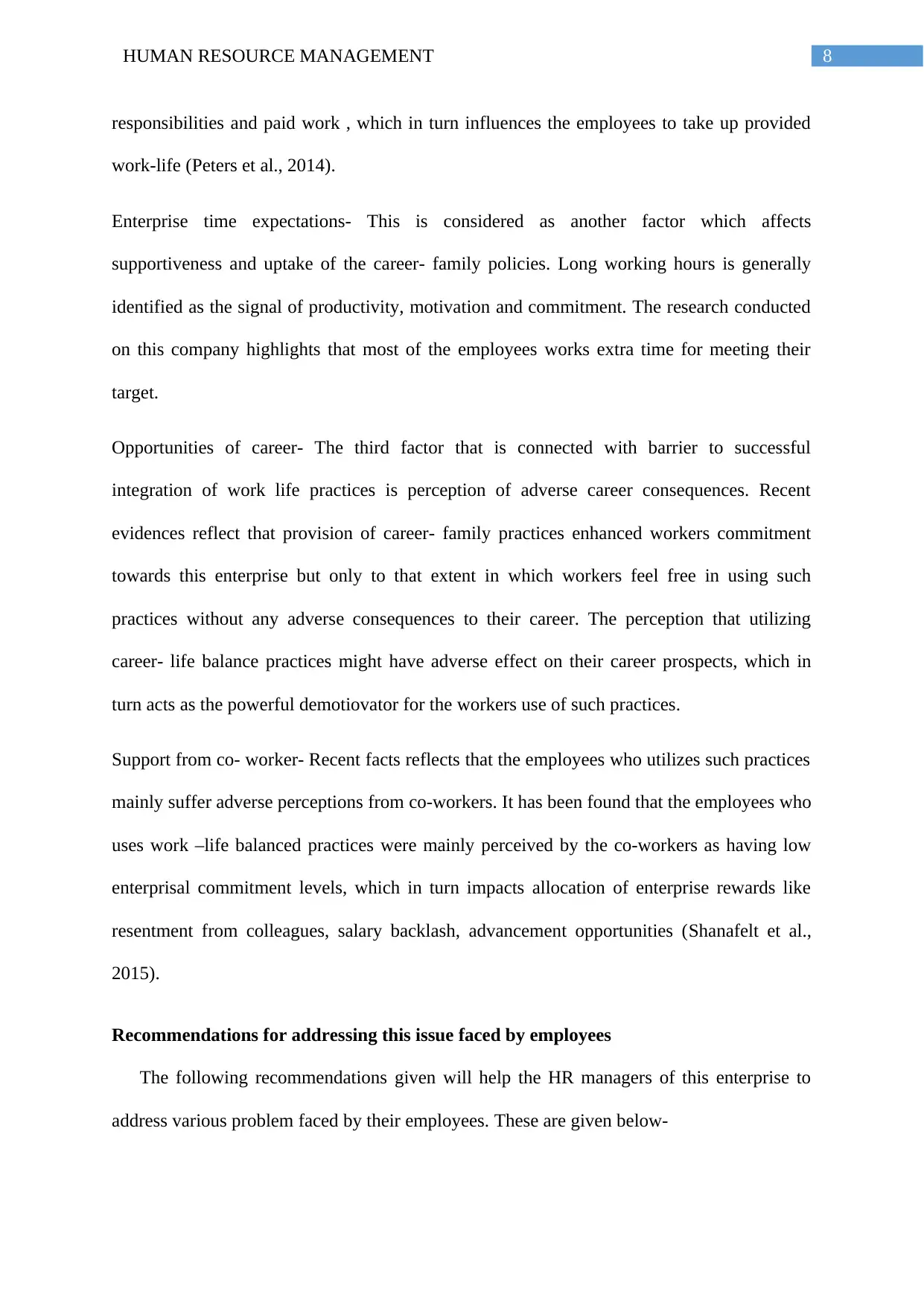
8HUMAN RESOURCE MANAGEMENT
responsibilities and paid work , which in turn influences the employees to take up provided
work-life (Peters et al., 2014).
Enterprise time expectations- This is considered as another factor which affects
supportiveness and uptake of the career- family policies. Long working hours is generally
identified as the signal of productivity, motivation and commitment. The research conducted
on this company highlights that most of the employees works extra time for meeting their
target.
Opportunities of career- The third factor that is connected with barrier to successful
integration of work life practices is perception of adverse career consequences. Recent
evidences reflect that provision of career- family practices enhanced workers commitment
towards this enterprise but only to that extent in which workers feel free in using such
practices without any adverse consequences to their career. The perception that utilizing
career- life balance practices might have adverse effect on their career prospects, which in
turn acts as the powerful demotiovator for the workers use of such practices.
Support from co- worker- Recent facts reflects that the employees who utilizes such practices
mainly suffer adverse perceptions from co-workers. It has been found that the employees who
uses work –life balanced practices were mainly perceived by the co-workers as having low
enterprisal commitment levels, which in turn impacts allocation of enterprise rewards like
resentment from colleagues, salary backlash, advancement opportunities (Shanafelt et al.,
2015).
Recommendations for addressing this issue faced by employees
The following recommendations given will help the HR managers of this enterprise to
address various problem faced by their employees. These are given below-
responsibilities and paid work , which in turn influences the employees to take up provided
work-life (Peters et al., 2014).
Enterprise time expectations- This is considered as another factor which affects
supportiveness and uptake of the career- family policies. Long working hours is generally
identified as the signal of productivity, motivation and commitment. The research conducted
on this company highlights that most of the employees works extra time for meeting their
target.
Opportunities of career- The third factor that is connected with barrier to successful
integration of work life practices is perception of adverse career consequences. Recent
evidences reflect that provision of career- family practices enhanced workers commitment
towards this enterprise but only to that extent in which workers feel free in using such
practices without any adverse consequences to their career. The perception that utilizing
career- life balance practices might have adverse effect on their career prospects, which in
turn acts as the powerful demotiovator for the workers use of such practices.
Support from co- worker- Recent facts reflects that the employees who utilizes such practices
mainly suffer adverse perceptions from co-workers. It has been found that the employees who
uses work –life balanced practices were mainly perceived by the co-workers as having low
enterprisal commitment levels, which in turn impacts allocation of enterprise rewards like
resentment from colleagues, salary backlash, advancement opportunities (Shanafelt et al.,
2015).
Recommendations for addressing this issue faced by employees
The following recommendations given will help the HR managers of this enterprise to
address various problem faced by their employees. These are given below-
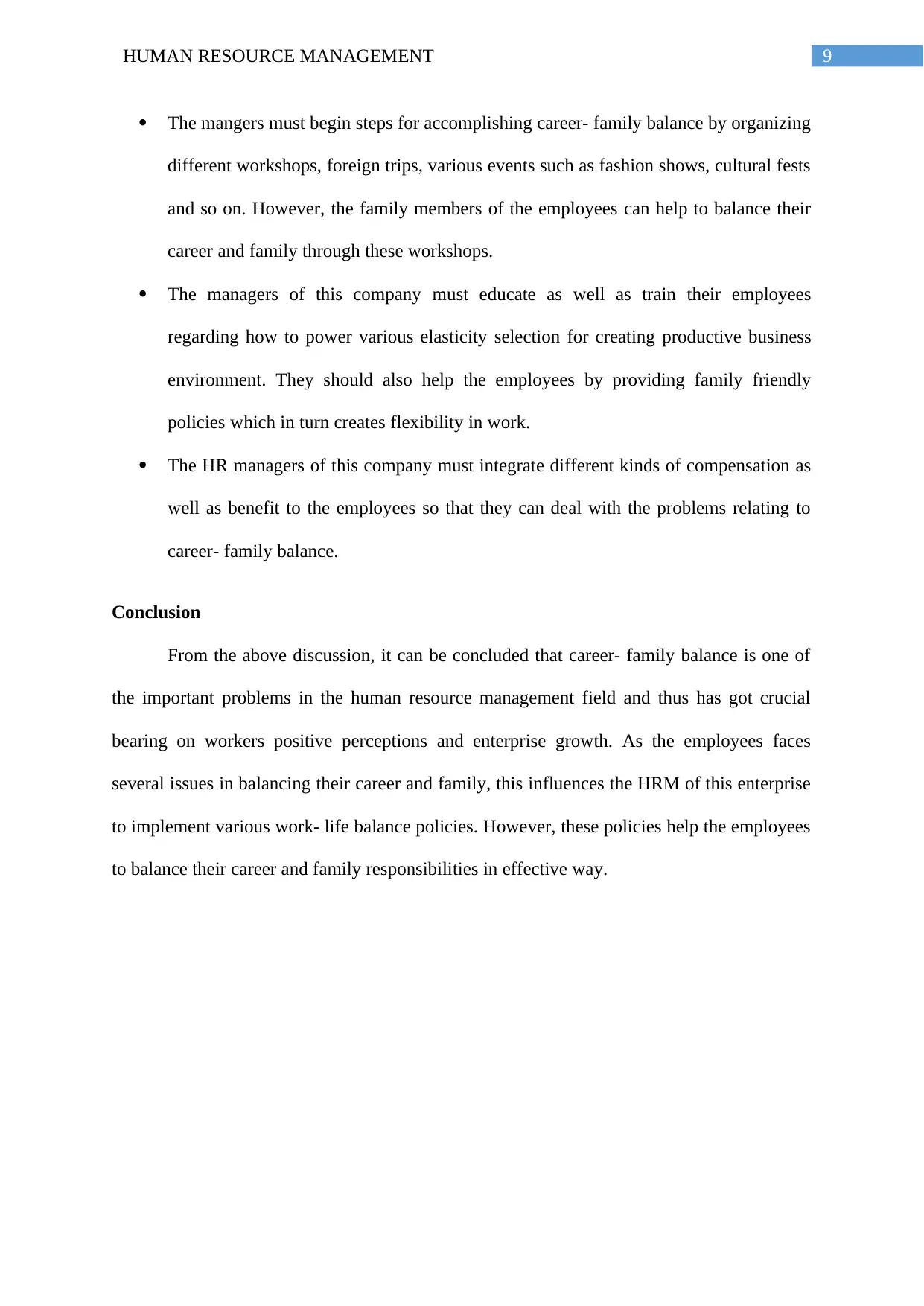
9HUMAN RESOURCE MANAGEMENT
The mangers must begin steps for accomplishing career- family balance by organizing
different workshops, foreign trips, various events such as fashion shows, cultural fests
and so on. However, the family members of the employees can help to balance their
career and family through these workshops.
The managers of this company must educate as well as train their employees
regarding how to power various elasticity selection for creating productive business
environment. They should also help the employees by providing family friendly
policies which in turn creates flexibility in work.
The HR managers of this company must integrate different kinds of compensation as
well as benefit to the employees so that they can deal with the problems relating to
career- family balance.
Conclusion
From the above discussion, it can be concluded that career- family balance is one of
the important problems in the human resource management field and thus has got crucial
bearing on workers positive perceptions and enterprise growth. As the employees faces
several issues in balancing their career and family, this influences the HRM of this enterprise
to implement various work- life balance policies. However, these policies help the employees
to balance their career and family responsibilities in effective way.
The mangers must begin steps for accomplishing career- family balance by organizing
different workshops, foreign trips, various events such as fashion shows, cultural fests
and so on. However, the family members of the employees can help to balance their
career and family through these workshops.
The managers of this company must educate as well as train their employees
regarding how to power various elasticity selection for creating productive business
environment. They should also help the employees by providing family friendly
policies which in turn creates flexibility in work.
The HR managers of this company must integrate different kinds of compensation as
well as benefit to the employees so that they can deal with the problems relating to
career- family balance.
Conclusion
From the above discussion, it can be concluded that career- family balance is one of
the important problems in the human resource management field and thus has got crucial
bearing on workers positive perceptions and enterprise growth. As the employees faces
several issues in balancing their career and family, this influences the HRM of this enterprise
to implement various work- life balance policies. However, these policies help the employees
to balance their career and family responsibilities in effective way.
Secure Best Marks with AI Grader
Need help grading? Try our AI Grader for instant feedback on your assignments.
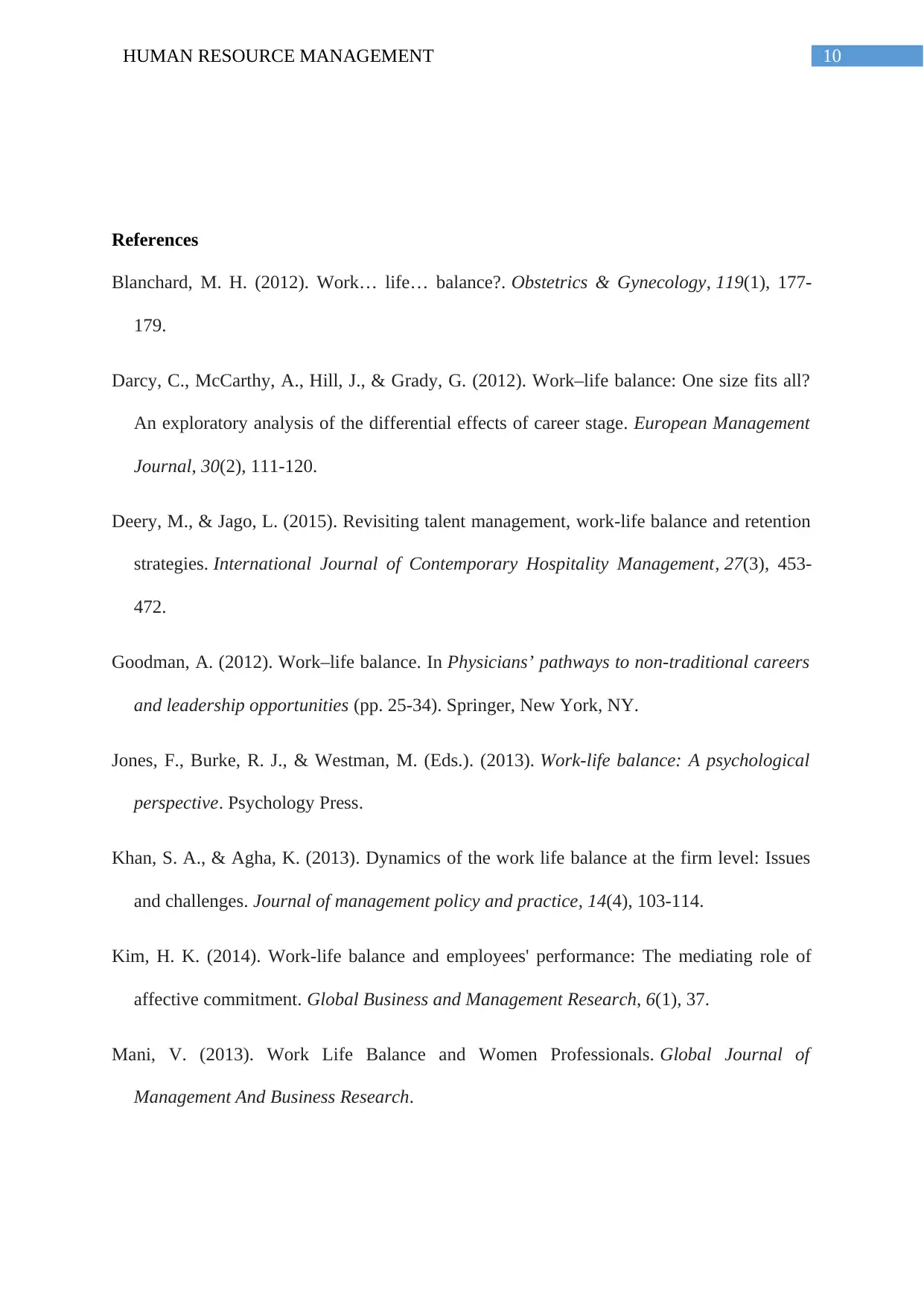
10HUMAN RESOURCE MANAGEMENT
References
Blanchard, M. H. (2012). Work… life… balance?. Obstetrics & Gynecology, 119(1), 177-
179.
Darcy, C., McCarthy, A., Hill, J., & Grady, G. (2012). Work–life balance: One size fits all?
An exploratory analysis of the differential effects of career stage. European Management
Journal, 30(2), 111-120.
Deery, M., & Jago, L. (2015). Revisiting talent management, work-life balance and retention
strategies. International Journal of Contemporary Hospitality Management, 27(3), 453-
472.
Goodman, A. (2012). Work–life balance. In Physicians’ pathways to non-traditional careers
and leadership opportunities (pp. 25-34). Springer, New York, NY.
Jones, F., Burke, R. J., & Westman, M. (Eds.). (2013). Work-life balance: A psychological
perspective. Psychology Press.
Khan, S. A., & Agha, K. (2013). Dynamics of the work life balance at the firm level: Issues
and challenges. Journal of management policy and practice, 14(4), 103-114.
Kim, H. K. (2014). Work-life balance and employees' performance: The mediating role of
affective commitment. Global Business and Management Research, 6(1), 37.
Mani, V. (2013). Work Life Balance and Women Professionals. Global Journal of
Management And Business Research.
References
Blanchard, M. H. (2012). Work… life… balance?. Obstetrics & Gynecology, 119(1), 177-
179.
Darcy, C., McCarthy, A., Hill, J., & Grady, G. (2012). Work–life balance: One size fits all?
An exploratory analysis of the differential effects of career stage. European Management
Journal, 30(2), 111-120.
Deery, M., & Jago, L. (2015). Revisiting talent management, work-life balance and retention
strategies. International Journal of Contemporary Hospitality Management, 27(3), 453-
472.
Goodman, A. (2012). Work–life balance. In Physicians’ pathways to non-traditional careers
and leadership opportunities (pp. 25-34). Springer, New York, NY.
Jones, F., Burke, R. J., & Westman, M. (Eds.). (2013). Work-life balance: A psychological
perspective. Psychology Press.
Khan, S. A., & Agha, K. (2013). Dynamics of the work life balance at the firm level: Issues
and challenges. Journal of management policy and practice, 14(4), 103-114.
Kim, H. K. (2014). Work-life balance and employees' performance: The mediating role of
affective commitment. Global Business and Management Research, 6(1), 37.
Mani, V. (2013). Work Life Balance and Women Professionals. Global Journal of
Management And Business Research.
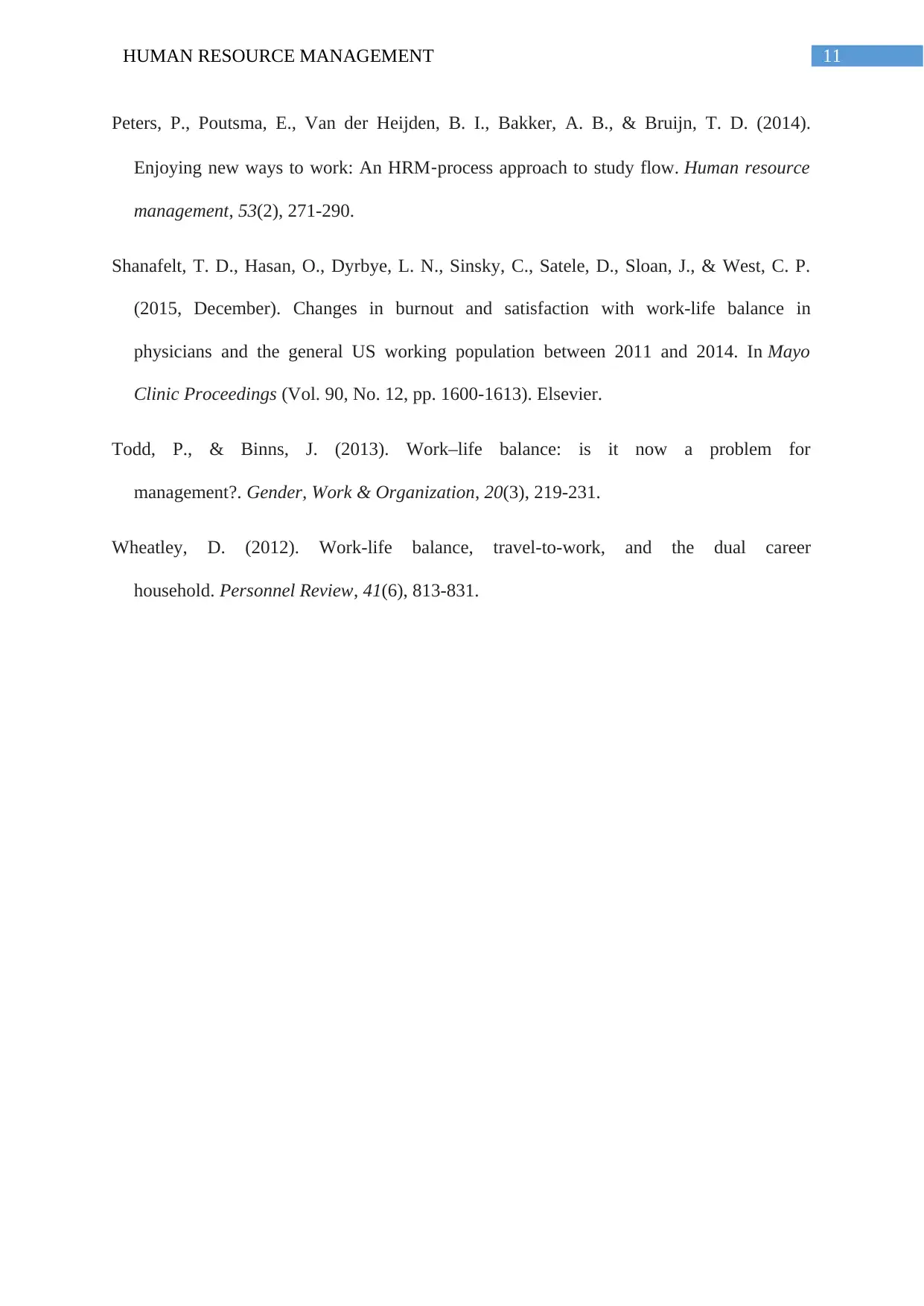
11HUMAN RESOURCE MANAGEMENT
Peters, P., Poutsma, E., Van der Heijden, B. I., Bakker, A. B., & Bruijn, T. D. (2014).
Enjoying new ways to work: An HRM‐process approach to study flow. Human resource
management, 53(2), 271-290.
Shanafelt, T. D., Hasan, O., Dyrbye, L. N., Sinsky, C., Satele, D., Sloan, J., & West, C. P.
(2015, December). Changes in burnout and satisfaction with work-life balance in
physicians and the general US working population between 2011 and 2014. In Mayo
Clinic Proceedings (Vol. 90, No. 12, pp. 1600-1613). Elsevier.
Todd, P., & Binns, J. (2013). Work–life balance: is it now a problem for
management?. Gender, Work & Organization, 20(3), 219-231.
Wheatley, D. (2012). Work-life balance, travel-to-work, and the dual career
household. Personnel Review, 41(6), 813-831.
Peters, P., Poutsma, E., Van der Heijden, B. I., Bakker, A. B., & Bruijn, T. D. (2014).
Enjoying new ways to work: An HRM‐process approach to study flow. Human resource
management, 53(2), 271-290.
Shanafelt, T. D., Hasan, O., Dyrbye, L. N., Sinsky, C., Satele, D., Sloan, J., & West, C. P.
(2015, December). Changes in burnout and satisfaction with work-life balance in
physicians and the general US working population between 2011 and 2014. In Mayo
Clinic Proceedings (Vol. 90, No. 12, pp. 1600-1613). Elsevier.
Todd, P., & Binns, J. (2013). Work–life balance: is it now a problem for
management?. Gender, Work & Organization, 20(3), 219-231.
Wheatley, D. (2012). Work-life balance, travel-to-work, and the dual career
household. Personnel Review, 41(6), 813-831.
1 out of 12
Related Documents
Your All-in-One AI-Powered Toolkit for Academic Success.
+13062052269
info@desklib.com
Available 24*7 on WhatsApp / Email
![[object Object]](/_next/static/media/star-bottom.7253800d.svg)
Unlock your academic potential
© 2024 | Zucol Services PVT LTD | All rights reserved.





